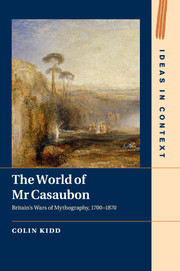Book contents
- Frontmatter
- Contents
- Acknowledgements
- 1 Prologue: Casaubon's Dubious Bequest
- 2 The Key to All Mythologies
- 3 The Legacies of the Ancients in Enlightenment Mythography
- 4 The Obsessions of Jacob Bryant: Arkite Idolatry and the Quest for Troy
- 5 The Dispute of the Orient: Anglo-French Rivalries in an Age of Revolution
- 6 Fish-gods, Floods and Serpent-worship: From Apologetics to Anthropology
- 7 Epilogue: The Keys to All Mythology in 1872
- Index
- Miscellaneous Endmatter
6 - Fish-gods, Floods and Serpent-worship: From Apologetics to Anthropology
Published online by Cambridge University Press: 24 November 2016
- Frontmatter
- Contents
- Acknowledgements
- 1 Prologue: Casaubon's Dubious Bequest
- 2 The Key to All Mythologies
- 3 The Legacies of the Ancients in Enlightenment Mythography
- 4 The Obsessions of Jacob Bryant: Arkite Idolatry and the Quest for Troy
- 5 The Dispute of the Orient: Anglo-French Rivalries in an Age of Revolution
- 6 Fish-gods, Floods and Serpent-worship: From Apologetics to Anthropology
- 7 Epilogue: The Keys to All Mythology in 1872
- Index
- Miscellaneous Endmatter
Summary
[S]he had listened with fervid patience to a recitation of possible arguments to be brought against Mr Casaubon's entirely new view of the Philistine god Dagon and other fish-deities.
(Middlemarch, ch. 20)George Eliot's Mr Casaubon, with his key to all mythologies, would have been, surely was, a member of the Ethnological Society; he would have been badly out of place among the fiercer spirits of the Anthropological Society.
(John Burrow, Evolution and Society)A handful of imaginary mythographers are interspersed among the genuine scholars who surface in Middlemarch. In particular Eliot invents a shoal of bogus dons who debated matters mythographical with Causaubon, namely Messrs Pike, Tench and Carp. Is there some deeper layer of allusion in this superficial jest about fish? Eliot also refers in Middlemarch to ‘fish-deities’, among whom she includes the Philistine god Dagon. Are the fish-deities connected in some way to the joke about the scholars with fishy names? This chapter will explore the nineteenth-century debate about fish deities as distorted remembrances of the Flood. It will also explore another similar theme associated with the animal world which attracted considerable attention from mythographers in the early and mid-nineteenth century, the issue of whether forms of serpent-worship in the ancient pagan world and in contemporary ‘primitive’ societies referred back to the Fall of Man in the Garden of Eden. In the early nineteenth century the apologetic school of collateral evidences used the evidence of such cults to reinforce its arguments about the original unity of all mythologies; later, however, anthropologists appropriated the matter of serpent-worship and put it to other ends.
Nevertheless, the division between the apologetic and the anthropological deployment of serpent-worship was, as we shall see, far from clear cut. There was also a strain of ethnology – alluded to by John Burrow in his classic work Evolution and Society– which constituted an intermediate genre between older forms of religious apologetic and a fully secularised, or indeed decidedly anti-religious, anthropology. By the time of Middlemarch's publication, the debate over serpent-worship took place on a strange terrain fought over by several scholarly armies, not simply by defenders of orthodoxy and by those anthropologists who would reduce fish-gods and serpent-gods to mere tribal totems.
- Type
- Chapter
- Information
- The World of Mr CasaubonBritain's Wars of Mythography, 1700–1870, pp. 176 - 199Publisher: Cambridge University PressPrint publication year: 2016



